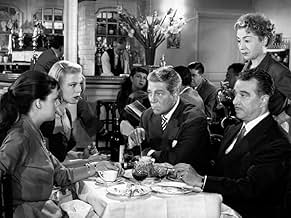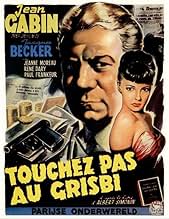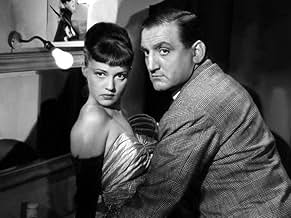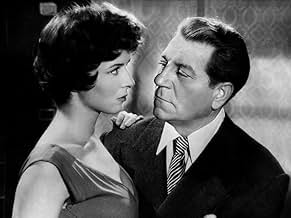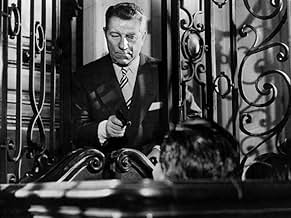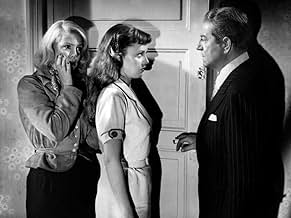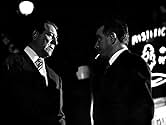VALUTAZIONE IMDb
7,7/10
9231
LA TUA VALUTAZIONE
Un vecchio gangster di fama internazionale viene ingannato ed è costretto a ritirarsi quando il suo migliore amico viene preso in ostaggio e la richiesta per il riscatto è molto alta.Un vecchio gangster di fama internazionale viene ingannato ed è costretto a ritirarsi quando il suo migliore amico viene preso in ostaggio e la richiesta per il riscatto è molto alta.Un vecchio gangster di fama internazionale viene ingannato ed è costretto a ritirarsi quando il suo migliore amico viene preso in ostaggio e la richiesta per il riscatto è molto alta.
- Regia
- Sceneggiatura
- Star
- Premi
- 1 vittoria e 1 candidatura in totale
Marilyn Buferd
- Betty
- (as Marilyn Bufferd)
Paul Barge
- Eugène
- (as Barge)
Alain Bouvette
- Le chauffeur de taxi
- (as Bouvette)
Recensioni in evidenza
Max and Riton are ageing gangsters who are trying to 'retire' after their latest big heist. Early on in a night club scene, Max intimates he would rather go home and sleep as he is tiring of night-clubbing and the late hours. Riton, his best and oldest friend, is trying to stay youthful, although unknown to him, he is getting cuckolded by a younger man right there at the club.
The bond between the friends is insoluble, even though they grouse inwardly about each other. If you ever had a lifetime friend, you will instantly connect with these two - you will just know the link. Anyway, without giving too much away, another crook wants to muscle in on their windfall with an undeserved split via the extortion route. That's all I can tell you, but get the DVD.
Max (played by the great Jean Gabin) has a secret pad, and to avoid trouble, invites Riton to stay overnight. These two are such old friends that, in a scene as humorous as it is tinged with melancholy, Max produces a pair of pajamas and a toothbrush for his old pal (remember sleepovers with a friend?).
The film takes a while to get underway, and all the action is toward the end of the picture, but you can overlook the pacing as it is an unforgettable homage to friendship and advancing age. Adding to the generational disconnect is the use of obsolete slang, as when Max calls someone 'Daddy-O' (Actually, it must have fit better in its initial release in 1954, but seems completely out-of-date now).
"Touchez Pas Au Grisbi" plays like a film noir/buddy picture and is thoroughly enjoyable and entertaining, Film buffs may recognize Jean Moreau as Riton's unfaithful girlfriend.
The bond between the friends is insoluble, even though they grouse inwardly about each other. If you ever had a lifetime friend, you will instantly connect with these two - you will just know the link. Anyway, without giving too much away, another crook wants to muscle in on their windfall with an undeserved split via the extortion route. That's all I can tell you, but get the DVD.
Max (played by the great Jean Gabin) has a secret pad, and to avoid trouble, invites Riton to stay overnight. These two are such old friends that, in a scene as humorous as it is tinged with melancholy, Max produces a pair of pajamas and a toothbrush for his old pal (remember sleepovers with a friend?).
The film takes a while to get underway, and all the action is toward the end of the picture, but you can overlook the pacing as it is an unforgettable homage to friendship and advancing age. Adding to the generational disconnect is the use of obsolete slang, as when Max calls someone 'Daddy-O' (Actually, it must have fit better in its initial release in 1954, but seems completely out-of-date now).
"Touchez Pas Au Grisbi" plays like a film noir/buddy picture and is thoroughly enjoyable and entertaining, Film buffs may recognize Jean Moreau as Riton's unfaithful girlfriend.
10pzanardo
It would be nonsense to give an order of merit to the three cinematic masterpieces by director Jacques Becker. However, personally I love "Touchez pas au grisbi" even more than "Casque d'or" or "Le Trou". In "Touchez pas au grisbi" we find all we can ask from a Becker's film: splendid black-and-white cinematography, evocative, romantic atmosphere, brilliant script, stunning excellence of the actors' job. But here we get more: a tough, perfectly written gangster-story, swift pace and action blended with an outstanding psychological design.
The movie is mainly a story of friendship and honor. We have two old pals, two aged gangsters close to retire: Max (Jean Gabin), smart and clever, well aware that their best years are over, and Riton (Rene Dary), naive and rash, unable to accept the end of their youth, even dumb if you want, but extremely brave and devoted to his friend. Max is constantly grumbling against Riton and the troubles he causes. He scorns Riton's courage... brains and good sense, that's the important thing... But when it's the time for action, we see how deep and touching their friendship is, how ready they are to sacrifice themselves for each other. In other words, there are circumstances when only courage and honor count...
According to his usual style, Becker describes the world of criminals as a weird parallel of the world of "decent people". To be a gangster appears a job like another: a day at the office. See Max's poise and professional way, when he negotiates the value of the "grisbi" (the swag) with the receiver. And when Max is going to face a last-blood gang-war, he quietly leaves a large sum of money to a trusted bar-maid, in case of need "... to tip somebody (i.e. police or judges)... to fix possible problems... you know better..."
Inside a story narrated in the most understated way, Becker inserts unexpected explosions of violence. Take the owner of the Night Club, another old pal of Max's and Riton's. Poised, always silent, short, fat, with thick glasses, he seems the less harmful person. Yet, suddenly, and without a single word of comment, he starts to brutally beat a thug from a rival gang. And, with the machine-gun, he shows himself even tougher than Max and Riton.
Of course, the movie also offers a Gabin's trade-mark scene, when he slaps everybody, men and women as well. Great stuff: toughness mixed with sense of humour. Gabin's performance is at the highest level reached in a glorious career.
What else to add? "Touchez pas au grisbi" is a fantastic masterpiece. Moreover, I guess that this film is good for all tastes , which probably can't be said for other Becker's cinematic gems.
The movie is mainly a story of friendship and honor. We have two old pals, two aged gangsters close to retire: Max (Jean Gabin), smart and clever, well aware that their best years are over, and Riton (Rene Dary), naive and rash, unable to accept the end of their youth, even dumb if you want, but extremely brave and devoted to his friend. Max is constantly grumbling against Riton and the troubles he causes. He scorns Riton's courage... brains and good sense, that's the important thing... But when it's the time for action, we see how deep and touching their friendship is, how ready they are to sacrifice themselves for each other. In other words, there are circumstances when only courage and honor count...
According to his usual style, Becker describes the world of criminals as a weird parallel of the world of "decent people". To be a gangster appears a job like another: a day at the office. See Max's poise and professional way, when he negotiates the value of the "grisbi" (the swag) with the receiver. And when Max is going to face a last-blood gang-war, he quietly leaves a large sum of money to a trusted bar-maid, in case of need "... to tip somebody (i.e. police or judges)... to fix possible problems... you know better..."
Inside a story narrated in the most understated way, Becker inserts unexpected explosions of violence. Take the owner of the Night Club, another old pal of Max's and Riton's. Poised, always silent, short, fat, with thick glasses, he seems the less harmful person. Yet, suddenly, and without a single word of comment, he starts to brutally beat a thug from a rival gang. And, with the machine-gun, he shows himself even tougher than Max and Riton.
Of course, the movie also offers a Gabin's trade-mark scene, when he slaps everybody, men and women as well. Great stuff: toughness mixed with sense of humour. Gabin's performance is at the highest level reached in a glorious career.
What else to add? "Touchez pas au grisbi" is a fantastic masterpiece. Moreover, I guess that this film is good for all tastes , which probably can't be said for other Becker's cinematic gems.
Jacques Becker 1954 "Touchez pas au grisbi" is a delight to watch. M. Becker was an artist that knew what to give his fans, as he clearly shows in this masterful account about the gangsters operating in Paris during the fifties. Becker and his cinematographer, Pierre Montazel, brought the cameras to the streets as we are taken to savor that underworld they operated from. The jazzy score by Jean Wiener works well in the film. The film shows us the bygone Paris of that period, beautifully photographed by M. Montazel in all its splendor.
At the center of it all is Max, the older gangster who suddenly begins feeling the toll of his years living dangerously and is contemplating retirement after he, and his partner, Riton, get rid of the gold bars they have stolen from a shipment at Orly airport. Max and Riton are seen at the beginning of the film dining at Chez Bouche with two younger women, Josy and Lola, who are chorus girls in the night club that seems to be the venue where these characters like to frequent.
Things get complicated when Josie tells the newly arrived Angelo about what Max and Riton have and the trouble starts as he wants to get to the stolen goods for his own benefit. Thus begins a conflict between two different factions of the underground that will end badly. Max's plans for retirement with the proceeds of the sale of the stolen gold will have to wait.
The best thing about the film is the uncanny way M. Becker and his collaborators reproduce that era for us. The world of the night clubs, restaurants, watering places, apartments, and other places where these characters move, are faithfully recreated for our pleasure in the movie. This film noir influenced a lot of other movies that came after, as Becker's influence inspired future movie makers.
Jean Gabin, probably the best French actor of all times makes us like his Max, even though we realize he is a criminal. M. Gabin is the whole reason for taking a look at this film that he dominates at all times. Rene Dary, is seen as Max's partner in crime, Riton. Jeanne Moreau in one of her earlier films shows why she went to be one of the stars of the French cinema. Her Josie is excellent. Also in the cast, the fabulous Lino Ventura who plays Angelo. Denise Clair plays Mme. Bouche and Dora Doll is Lola.
"Touchez pas au grisbi" will not disappoint Becker's fans.
At the center of it all is Max, the older gangster who suddenly begins feeling the toll of his years living dangerously and is contemplating retirement after he, and his partner, Riton, get rid of the gold bars they have stolen from a shipment at Orly airport. Max and Riton are seen at the beginning of the film dining at Chez Bouche with two younger women, Josy and Lola, who are chorus girls in the night club that seems to be the venue where these characters like to frequent.
Things get complicated when Josie tells the newly arrived Angelo about what Max and Riton have and the trouble starts as he wants to get to the stolen goods for his own benefit. Thus begins a conflict between two different factions of the underground that will end badly. Max's plans for retirement with the proceeds of the sale of the stolen gold will have to wait.
The best thing about the film is the uncanny way M. Becker and his collaborators reproduce that era for us. The world of the night clubs, restaurants, watering places, apartments, and other places where these characters move, are faithfully recreated for our pleasure in the movie. This film noir influenced a lot of other movies that came after, as Becker's influence inspired future movie makers.
Jean Gabin, probably the best French actor of all times makes us like his Max, even though we realize he is a criminal. M. Gabin is the whole reason for taking a look at this film that he dominates at all times. Rene Dary, is seen as Max's partner in crime, Riton. Jeanne Moreau in one of her earlier films shows why she went to be one of the stars of the French cinema. Her Josie is excellent. Also in the cast, the fabulous Lino Ventura who plays Angelo. Denise Clair plays Mme. Bouche and Dora Doll is Lola.
"Touchez pas au grisbi" will not disappoint Becker's fans.
Max(Jean Gabin) is a gentleman gangster with a penchant for nice suits and champagne and the brains of the criminal partnership, the other being his long time friend and partner in crime, Riton (René Dary),"the muscle" so to speak of their partnership, together they have just pulled off a substantial heist and are now 50 million francs better off in gold bars. Max likes the easy life of night clubs and restaurants, he isn't greedy and now intends to retire with his fortune, Riton agrees, but he inadvertently tells his young night club dancer girlfriend Josy (Jeanne Moreau)of his large stash of Grisbi(Loot/Swag), she has been two timing him with the much younger and very ambitious crook Angelo, Josy of course informs him and using this knowledge Angelo sets out to take it from Max. Max suspicious that he is being followed confides in Riton that something is about to happen,he also tells his old friend how he discovered Josy's infidelity, Riton is furious and leaves Max's safe haven to take revenge on his younger adversary.Riton ends up in a trap and is kidnapped by Angelo, demanding Max release the gold as ransom. Touchez pas au grisbi isn't so much an action crime flic as it is a no action one, we never get to see the heist or the every day violence of the criminal fraternity, Becker's film is much more about the silences between the crimes and the everyday mundaneness of the criminals life, their conversations, their dining habits etc
this ploy is all the more effective when the film explodes at its climax with the type of violence you would expect of a typical Crime film. A forerunner of Dassin's Rififi or more obviously Melville's Bob Le Flambeur, Touchez pas au Grisbi is a fine film that some might find a little dull, but its romantic vision of Parisien criminal lives is still very intriguing and a welcome alternative to the stereotypical hoods of the genre. Gabin is nothing short of superb as the aging gangster, willing to give up his position and power for the easy life, his relationship with his loyal friend Riton is more like that of a married couple who are still friends after many years together but ultimately wonder why they ever got together, we are only given one glimpse of Max's rage towards his friend in a brief voice over, where Max lets fly at his companions stupidity, that might cost them both their lives and their Grisbi, other than that Max is a cool operator, nothing fazes him, even as the plot thickens and a quick response is required to save Riton's life, Max is just as easy going as he always is, he might just as easily be at home brushing his teeth or folding his pyjamas again, we never quite know what Max is thinking. The understated pate eating scene is superbly orchestrated by Becker ,there is hardly any dialogue but through gestures and eye movements, we learn an awful lot about their relationship
..Touchez pas au Grisbi in the hands of Becker is both elegant and evocative and a pleasure to behold and as French Noir goes its right up there with the best.
In his pre-war career, Jean Gabin was the greatest French actor of his generation, the living incarnation of a youthful but not immature ardor, a tough and no-nonsense approach to life, a hardened tenacity à la French, all combined with a "Lady Killer" face. With directors such as Duvivier and Carné, he became the figurehead of the poetic realism genre, perhaps French cinema's finest hour, from 1935 to 1939.
But war broke up and Gabin took part to the war effort along the Allies (the right side). When he was back, his hair became grayer, and he looked much older than his actual age. And then started a long slump in his career where he lost his way in forgettable dramas and tear-jerkers. Meanwhile, audiences were thrilled by Jean Marais and laughing with Fernandel. It took Jacques Becker to finally understand the new appeal of Gabin and by adapting Antoine Simonin's level, started his second career as the aging leader (after the romantic antihero and before the white-haired patriarch). The film was "Touchez pas au Grisbi" (Don't Touch the Loot).
And Max is the perfect alter-ego to Gabin, an world-weary hoodlum who just committed his greatest crime before retirement, stealing eight golden ingots from Orly with his friend and partner Riton (René Dary); That Gabin is still a Ladies' Man, attracting voluptuous burlesque dancers and sexy secretaries, tough enough to distribute a few slaps here and principled enough not to abandon his friend. Still, the film doesn't overplay these traits. Max is blasé about his sex-appeal, not quite obsessed with women, only his job and his friends matter.
The film features a long sequence when we seem him opening a bottle, pouring a good wine to him and Riton, cracking a toast, smearing the pâté as meticulously as if they were cracking a safe. And then we see him putting on his pajamas and brushing his teeth. It's not meant to make him look ordinary but to insist that he doesn't let himself distracted by girls, unlike Riton, his total opposite. Riton blabbed to his girlfriend Josy (Jeanne Moreau) about the heist, an information she gave to her new boyfriend Angelo (Lino Ventura), and last time I saw such an epic slap, it was between Steve McQueen and Ali McGraw in "The Getaway". Anyway, Riton is the square one, the softie, not even able to see when he's lured into a trap and in a way, there's something of the slipping Gabin in that Riton, his streak of failing melodramas might have killed his career if Becker didn't find him a tailor-made role.
But Becker did more than putting Gabin's career in the right track, he started a new one and not the least. Lino Ventura was a wrestling matches organizer when he was offered the role of the heavy Angelo. He never pictured himself as an actor and turned down the offer first. He hadn't made up his mind when he came to meet Jean Gabin in the set, it took Becker's son to take him to Gabin's dressing room. When the two men met, Gabin said "How are you?" Ventura said "fine" and Gabin concluded with "well, see you later". That was it. That's all it took for Ventura to accept the role that would instantly put him in the bandwagon of male icon, Gabin's straightforward humility was the perfect trigger to Ventura's motivation. He understood that he was dealing with pros and no-nonsense guys, not stars.
Like Gabin, Ventura never faked, he was a natural, and that showed on the screen. The two men were often rival in the movies but good friends in real life, sharing their passion for good restaurants and values such as friendship and family. So before its own making "Touchez pas au Grisbi" was already blessed by the charisma of two actors and the predestination classic. At a time filled with colorful costume dramas and big-budgeted swashbucklers to counter-attack the rise of TV, Becker opted for a minimalist subject but with a great casting. The format of "Grisbi" is linear and simple, the plot is so accessible that it's secondary, the real thrills is to rediscover Gabin inhabiting a new and see him with deal with people who are as smart and professional as he is.
Angelo is actually a perfect foil for Max while the good friend Riton Is so inept Max contemplated the idea of abandoning him. But Gabin could play greedy thugs but not without honor, and no one would have imagined him being something else. Same with Ventura. And "Grisbi" would open the way to noir classics as "Razzia" "Rififi" or Melville's "Bob le Flambeur", featuring stories mostly set at night when honest people are sleeping, movies centering on men with values and guts, and women whose main purpose is to drive the plot and not in the right direction as the catalysts of men's weaknesses. The female ally was often an aging woman herself, but these movies never held youth in high esteem, we didn't see many kids, young criminals were the most gullible and young women not trustworthy.,
These movies reminded me of that Godfather quote "women and children can be careless, but not men" and perhaps in this line lies the big shift between the old school popular cinema of the 50s 60s and the New Wave that featured many movie centering on youth and women: "400 Blows", "Jules and Jim" with Brigitte Bardot as the new sensation. Belmondo and Delon would later co-star with Gabin and Ventura and then portray in solo, cops or gangsters, like the old men, to prove that macho heroes could still surf the New Wave, and over it.
So, behind his minimalist but efficient approach to the crime genre, "Touchez pas au Grisbi" is a triple milestone in French cinema: restoring Jean Gabin's career, starting Lino Ventura's one and bringing a second breath to French noir cinema.
But war broke up and Gabin took part to the war effort along the Allies (the right side). When he was back, his hair became grayer, and he looked much older than his actual age. And then started a long slump in his career where he lost his way in forgettable dramas and tear-jerkers. Meanwhile, audiences were thrilled by Jean Marais and laughing with Fernandel. It took Jacques Becker to finally understand the new appeal of Gabin and by adapting Antoine Simonin's level, started his second career as the aging leader (after the romantic antihero and before the white-haired patriarch). The film was "Touchez pas au Grisbi" (Don't Touch the Loot).
And Max is the perfect alter-ego to Gabin, an world-weary hoodlum who just committed his greatest crime before retirement, stealing eight golden ingots from Orly with his friend and partner Riton (René Dary); That Gabin is still a Ladies' Man, attracting voluptuous burlesque dancers and sexy secretaries, tough enough to distribute a few slaps here and principled enough not to abandon his friend. Still, the film doesn't overplay these traits. Max is blasé about his sex-appeal, not quite obsessed with women, only his job and his friends matter.
The film features a long sequence when we seem him opening a bottle, pouring a good wine to him and Riton, cracking a toast, smearing the pâté as meticulously as if they were cracking a safe. And then we see him putting on his pajamas and brushing his teeth. It's not meant to make him look ordinary but to insist that he doesn't let himself distracted by girls, unlike Riton, his total opposite. Riton blabbed to his girlfriend Josy (Jeanne Moreau) about the heist, an information she gave to her new boyfriend Angelo (Lino Ventura), and last time I saw such an epic slap, it was between Steve McQueen and Ali McGraw in "The Getaway". Anyway, Riton is the square one, the softie, not even able to see when he's lured into a trap and in a way, there's something of the slipping Gabin in that Riton, his streak of failing melodramas might have killed his career if Becker didn't find him a tailor-made role.
But Becker did more than putting Gabin's career in the right track, he started a new one and not the least. Lino Ventura was a wrestling matches organizer when he was offered the role of the heavy Angelo. He never pictured himself as an actor and turned down the offer first. He hadn't made up his mind when he came to meet Jean Gabin in the set, it took Becker's son to take him to Gabin's dressing room. When the two men met, Gabin said "How are you?" Ventura said "fine" and Gabin concluded with "well, see you later". That was it. That's all it took for Ventura to accept the role that would instantly put him in the bandwagon of male icon, Gabin's straightforward humility was the perfect trigger to Ventura's motivation. He understood that he was dealing with pros and no-nonsense guys, not stars.
Like Gabin, Ventura never faked, he was a natural, and that showed on the screen. The two men were often rival in the movies but good friends in real life, sharing their passion for good restaurants and values such as friendship and family. So before its own making "Touchez pas au Grisbi" was already blessed by the charisma of two actors and the predestination classic. At a time filled with colorful costume dramas and big-budgeted swashbucklers to counter-attack the rise of TV, Becker opted for a minimalist subject but with a great casting. The format of "Grisbi" is linear and simple, the plot is so accessible that it's secondary, the real thrills is to rediscover Gabin inhabiting a new and see him with deal with people who are as smart and professional as he is.
Angelo is actually a perfect foil for Max while the good friend Riton Is so inept Max contemplated the idea of abandoning him. But Gabin could play greedy thugs but not without honor, and no one would have imagined him being something else. Same with Ventura. And "Grisbi" would open the way to noir classics as "Razzia" "Rififi" or Melville's "Bob le Flambeur", featuring stories mostly set at night when honest people are sleeping, movies centering on men with values and guts, and women whose main purpose is to drive the plot and not in the right direction as the catalysts of men's weaknesses. The female ally was often an aging woman herself, but these movies never held youth in high esteem, we didn't see many kids, young criminals were the most gullible and young women not trustworthy.,
These movies reminded me of that Godfather quote "women and children can be careless, but not men" and perhaps in this line lies the big shift between the old school popular cinema of the 50s 60s and the New Wave that featured many movie centering on youth and women: "400 Blows", "Jules and Jim" with Brigitte Bardot as the new sensation. Belmondo and Delon would later co-star with Gabin and Ventura and then portray in solo, cops or gangsters, like the old men, to prove that macho heroes could still surf the New Wave, and over it.
So, behind his minimalist but efficient approach to the crime genre, "Touchez pas au Grisbi" is a triple milestone in French cinema: restoring Jean Gabin's career, starting Lino Ventura's one and bringing a second breath to French noir cinema.
Lo sapevi?
- QuizFilm debut of Italian ex-wrestler Lino Ventura.
- BlooperWhen the submachine guns are removed from the wine box, they are Sten Submachine guns. When they are removed from the car after the ambush, they are Sten Guns. When they are finally shot at the retreating gangsters, they have become two different models of Thompson Submachine guns - an early civilian model of a Thompson and a military model (M1 or M1A1) of a Thompson.
- ConnessioniEdited into Histoire(s) du cinéma: Une vague nouvelle (1999)
I più visti
Accedi per valutare e creare un elenco di titoli salvati per ottenere consigli personalizzati
- How long is Don't Touch the Loot?Powered by Alexa
Dettagli
- Data di uscita
- Paesi di origine
- Sito ufficiale
- Lingua
- Celebre anche come
- Don't Touch the Loot
- Luoghi delle riprese
- Aziende produttrici
- Vedi altri crediti dell’azienda su IMDbPro
Botteghino
- Lordo Stati Uniti e Canada
- 131.548 USD
- Fine settimana di apertura Stati Uniti e Canada
- 21.674 USD
- 7 set 2003
- Lordo in tutto il mondo
- 131.548 USD
- Tempo di esecuzione1 ora 36 minuti
- Colore
- Proporzioni
- 1.33 : 1
Contribuisci a questa pagina
Suggerisci una modifica o aggiungi i contenuti mancanti


![Guarda Bande-annonce [OV]](https://m.media-amazon.com/images/M/MV5BMDdjNGE5Y2QtMDQ4My00M2Q3LTgwMGYtMjYxMzNlNmY1MTlhXkEyXkFqcGdeQXRyYW5zY29kZS13b3JrZmxvdw@@._V1_QL75_UX500_CR0)
